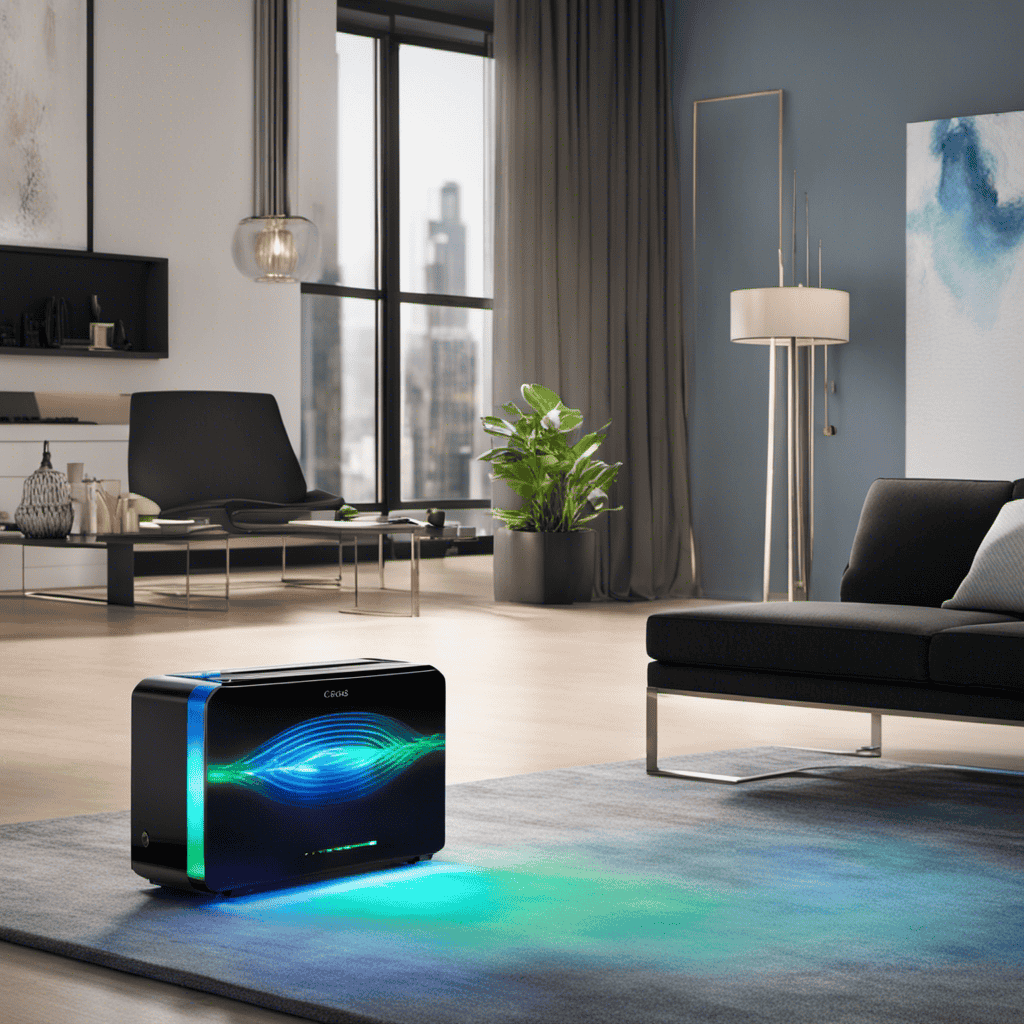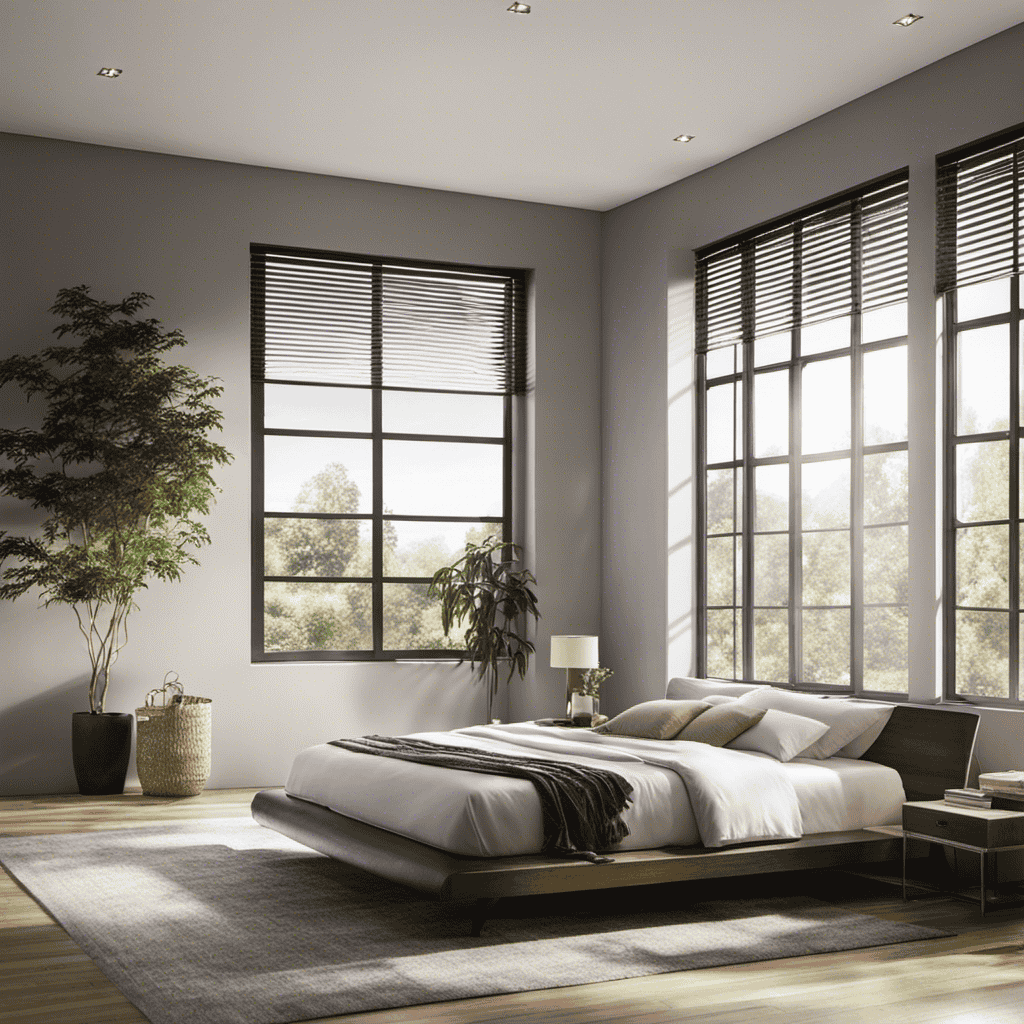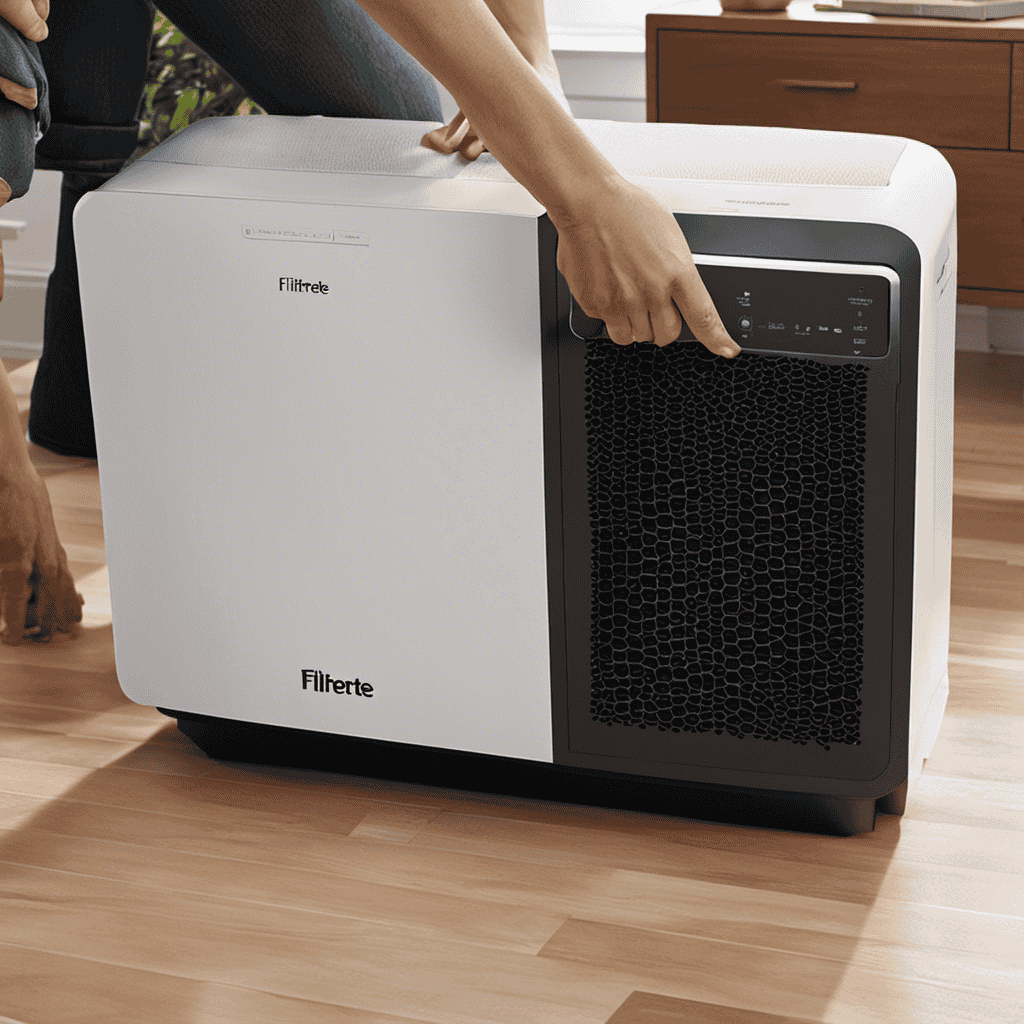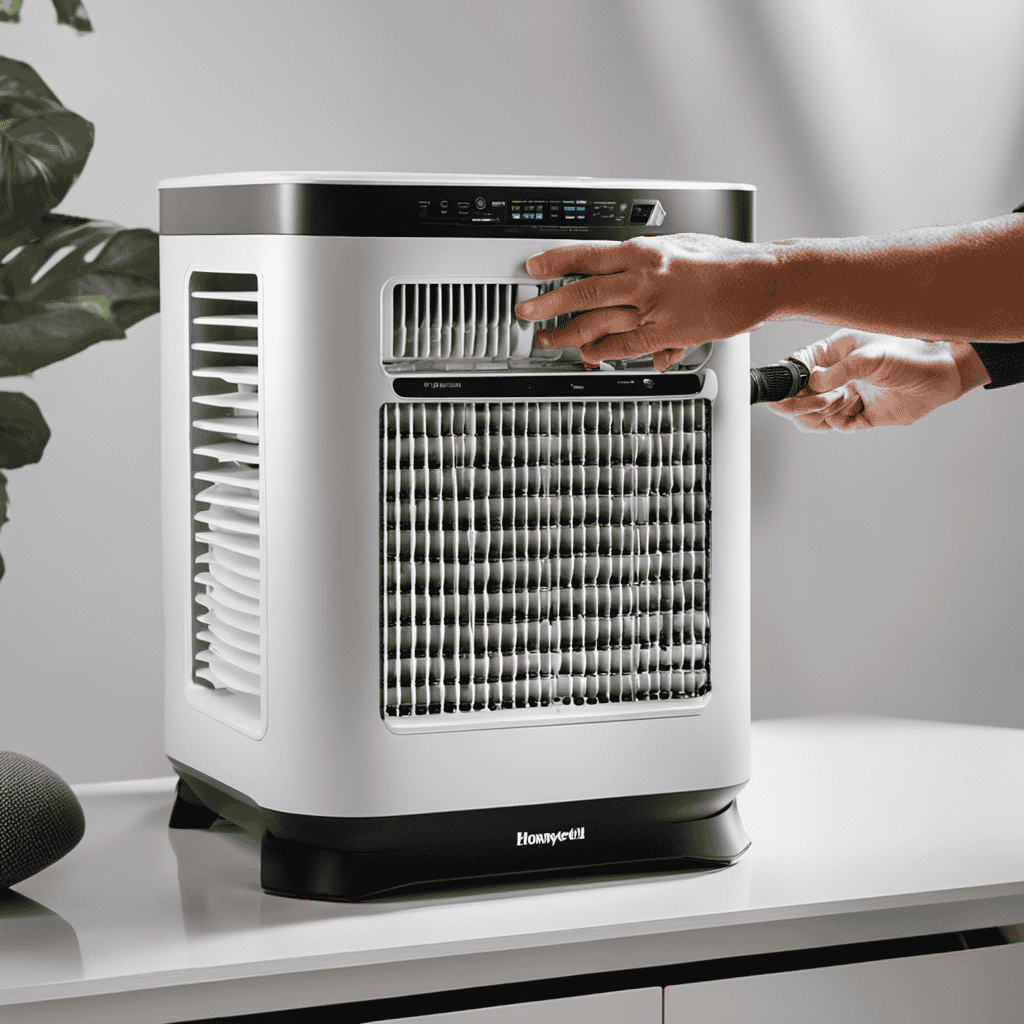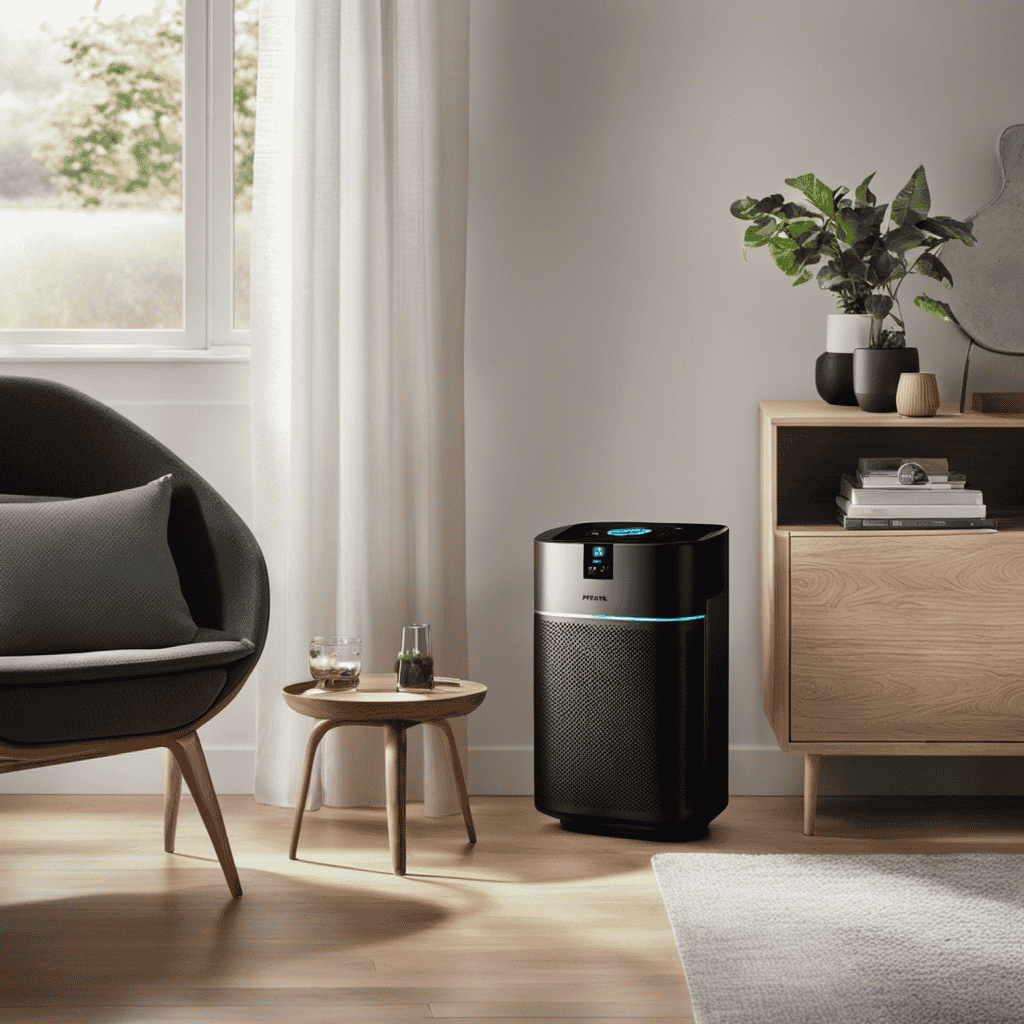You may be curious, “What exactly does an ionizer do in an air purifier?” Allow me to explain it to you.
An ionizer, found in certain air purifiers, is a powerful tool that helps improve indoor air quality. It works by releasing negative ions into the air, which attach to harmful particles like dust, allergens, and pollutants, causing them to become heavy and fall to the ground.
In this article, we will explore the benefits, functionality, and misconceptions surrounding ionizers in air purifiers. So, let’s dive in and uncover the truth about these fascinating devices.
Key Takeaways
- An ionizer in an air purifier eliminates harmful particles, improves air quality, and reduces allergens.
- The ionizer works by creating negative ions that attract positively charged particles, causing them to cluster together and become larger, which can then be trapped by the filter or fall to the ground.
- Ionizers are important in air purifiers as they capture smaller particles missed by filters, improve indoor air quality, and eliminate harmful bacteria and viruses.
- Common misconceptions about ionizers include concerns about ozone production, but air purifiers with ionizers meet safety standards, and there are alternative options available for those concerned about ozone.
Benefits of Using an Ionizer in an Air Purifier
Using an ionizer in an air purifier can help to eliminate harmful particles and improve overall air quality. The health benefits of using an ionizer in an air purifier are significant.
An ionizer works by emitting negative ions into the air, which attach to positively charged particles like dust, pollen, and mold spores. This causes the particles to become heavier and fall to the ground, effectively removing them from the air we breathe.
In comparison to air purifiers without ionizers, those with ionizers are generally more effective at capturing smaller particles and reducing allergens in the air. Additionally, ionizers can also help to neutralize odors and remove bacteria and viruses from the air.
Overall, incorporating an ionizer into an air purifier can greatly enhance its effectiveness in improving indoor air quality and promoting better health.
How Does an Ionizer Work in an Air Purifier
To understand how an ionizer works in an air purifier, you simply need to remember that it releases negatively charged ions into the air. These ions attach themselves to positively charged particles in the air, such as dust, pollen, and pet dander. Here’s a breakdown of how an ionizer works:
- Ionization: The air ionizer technology uses an electric charge to create negative ions, which are released into the air.
- Attraction: The negatively charged ions attract positively charged particles in the air, forming clusters.
- Agglomeration: As the particles cluster together, they become larger and heavier, making it easier for them to be captured.
- Filtration: The larger particles are then trapped by the air purifier’s filter or fall to the ground, effectively removing them from the air.
Compared to HEPA filters, which physically filter out particles, ionizers work by charging particles and causing them to cluster together. While HEPA filters are highly effective at removing particles, ionizers can help capture smaller particles that may be missed by the filter.
However, it’s important to note that ionizers can produce ozone as a byproduct, which can be harmful in high concentrations.
The Importance of Ionizers in Air Purifiers
Ionizers are important components of air purifiers because they help capture smaller particles that may be missed by filters. The role of ionizers in improving indoor air quality cannot be overstated. These devices work by emitting negative ions into the air, which attach themselves to airborne particles such as dust, pollen, and pet dander.
This process causes the particles to become negatively charged and clump together, making them easier to capture by air purifier filters or to simply fall out of the air. By effectively reducing the number of these tiny particles in the air, ionizers can help alleviate symptoms of allergies and asthma.
Additionally, ionizers can also help eliminate harmful bacteria and viruses, further improving the overall air quality in indoor spaces. While there are some concerns about the potential production of ozone by ionizers, when used properly and in combination with good ventilation, the health benefits of using ionizers in air purifiers outweigh the potential risks.
Common Misconceptions About Ionizers in Air Purifiers
One of the most common misconceptions about ionizers in air purifiers is that they produce harmful levels of ozone. However, this is not entirely true. While it is true that ionizers do produce some ozone, the levels are usually within safe limits and do not pose any significant negative effects on our health.
Here are some key points to consider:
-
Ozone production: Ionizers release negative ions into the air, which attach to particles and pollutants, causing them to fall to the ground or stick to surfaces. In the process, a small amount of ozone is created.
-
Safe ozone levels: Air purifiers with ionizers are designed to meet safety standards and emit ozone levels well below the limits set by regulatory agencies.
-
Health benefits: Ionizers can help remove allergens, pollen, and other airborne particles, improving indoor air quality and potentially reducing respiratory issues.
-
Alternative options: If you are concerned about ozone levels, you can choose air purifiers without ionizers or consider other technologies like HEPA filters, activated carbon filters, or UV light sterilization.
Tips for Choosing an Air Purifier With an Ionizer
When considering an air purifier with an ionizer, it’s important to research and compare different models to find the best option for your needs. Not all air purifiers are created equal, and there are various factors to consider such as the size of the room, the specific pollutants you want to remove, and your budget. To help you make an informed decision, I have created a table comparing three popular air purifier brands and their cost.
| Brand | Model | Cost |
|---|---|---|
| Brand A | Model X | $200 |
| Brand B | Model Y | $250 |
| Brand C | Model Z | $300 |
As you can see, the cost of air purifiers with ionizers can vary depending on the brand and model. It’s essential to weigh the features, performance, and price to find the best value for your money. Remember to also consider the long-term costs, such as filter replacements. Ultimately, by doing thorough research and comparing different options, you can find the perfect air purifier with an ionizer that suits your needs and budget.
Frequently Asked Questions
Can Ionizers in Air Purifiers Remove All Types of Air Pollutants?
Yes, ionizers in air purifiers can help remove various types of air pollutants. The benefits of using an ionizer include improved air quality and the effectiveness of ionizers in removing airborne particles such as dust, pollen, and pet dander.
Are There Any Health Risks Associated With Using an Ionizer in an Air Purifier?
There may be health risks associated with using an ionizer in an air purifier. It is important to consider the potential side effects and compare the effectiveness of ionizers to other air purification methods.
Do Ionizers in Air Purifiers Produce Any Harmful Byproducts?
Ionizers in air purifiers can produce harmful byproducts. However, their effectiveness in reducing pollutants cannot be ignored. It is crucial to consider the potential risks and benefits before using an ionizer.
Can Ionizers in Air Purifiers Eliminate Pet Dander and Allergens From the Air?
Ionizers in air purifiers can be effective in reducing pet dander and allergens from the air. They work by releasing negatively charged ions that attach to these pollutants, causing them to fall to the ground instead of floating in the air.
How Often Should the Ionizer in an Air Purifier Be Cleaned or Replaced?
The cleaning frequency and replacement schedule for the ionizer in an air purifier depends on the specific model and manufacturer. It is important to consult the user manual or contact the manufacturer for proper maintenance recommendations.
Are Ionizer Air Purifiers Effective at Purifying Air?
Yes, ionizer air purifier workings effectively remove particles from the air. By emitting negative ions, these purifiers can latch onto airborne particles and neutralize them, making them more easily trapped by filters. This process can significantly improve air quality, making ionizer air purifiers a popular choice for many consumers.
Conclusion
In conclusion, an ionizer in an air purifier plays a crucial role in improving indoor air quality. By emitting negatively charged ions, it helps to eliminate pollutants and allergens from the air, making it cleaner and healthier to breathe.
Contrary to some misconceptions, ionizers do not produce harmful ozone in significant amounts. When choosing an air purifier, it is important to consider one with an ionizer to maximize its effectiveness in removing airborne contaminants.
With an ionizer, you can enjoy fresher air and a more pleasant living environment.
